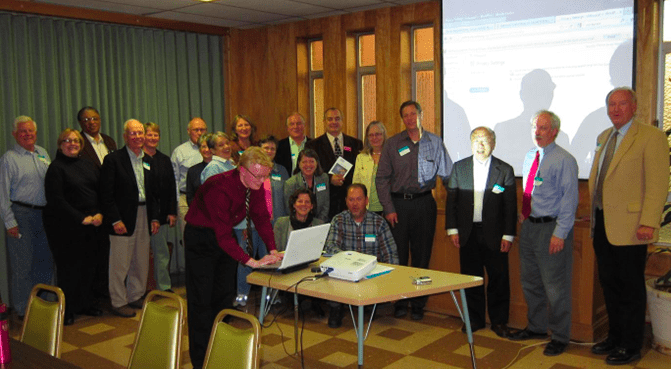Introducing the first theme-issue of Unbound: One editor’s overview
(Note: it will be our practice to have two editorials in many cases, to underline the difference in generational perspective between our Editor and our Managing Editor. Patrick Heery’s introductory editorial follows this one.)[wpcol_1half id=”” class=”” style=””]
In the movie, The Company Men, the Ben Affleck character goes from success to failure in the moment he is let go. A corporation that once made things now profits from shedding jobs. A common story, though well depicted in his loss of home, moving in with parents, tension with wife (who goes back to work), the hits his ego takes at a job placement center, the non-union carpentry work he gets from a kind of friend during his long and fruitless job hunt.
The fear of unemployment and underemployment stalks the land, and lives in the church as well. It is the big story at this time in American life. That film has a hopeful but not quite happy ending involving a former near-top executive with a very golden parachute. This journal begins with hope and the conviction that we need to take grim realities head on. Far from a parachute, our country is shredding its safety net.
But why read an on-line journal about the current “great recession” when you can watch movies about it? Or watch movies about anything other than an economic crisis we think we know too well already?
Because this is not only an economic crisis. We chose this issue’s title as an echo of St. John of the Cross’ great poem about a mystic seeking an absent or hidden God, from which we get the common phrase, “dark night of the soul.” On one level, the dark night of the economy does keep people awake at night, worrying about bills to pay, savings to use, relatives to beg from. On a larger scale, there is a moral absence that drives us to figure out why positive measures are not being taken and how to avert further de-moralization.
As we launch this issue, the Occupy Wall Street (OWS) movement is posing the inequality question in a major way, but our pay-to-play political system is not likely to provide the stimulus necessary to take our economy out of the current prolonged recession. Our horizon for examining the “corrosion of character” (Richard Sennett) embodied in our economic system is long term—though we touch on the Occupy movement in a discussion elsewhere.
OWS and its relatives reflect a disillusionment with government as well as with the economic royalty of our day. The danger in any complex situation is that real solutions get displaced by symbolic fixations, such as debt-ceiling limits choking effective government stimulus. Nobel-winning economist Paul Krugman compares the austerity measures being recommended to the use of leeches in the ancient treatment of disease. This is when we know we are on theological ground, rife with fundamentalism about salvific markets and demonic taxes, and with the ancient religious practice of scape-goating. A journal of any kind prompts reflection and invites analysis, in this case about the values for which a great many people’s vocations are being sacrificed.
The articles here present alternative views of what economies should do. These are Christian approaches from within a particular tradition, represented in General Assembly thinking, though we acknowledge and link to other approaches. There is some economic argumentation; economist John Winfrey’s article notes the challenges to our “American Dream” from both market and governmental failures. A mixed economy can be a mixed-up economy.
To review the articles briefly:
“Living Through Economic Crisis.” This is the General Assembly’s most recent word on the economic crisis, a social involvement report that stresses Christian compassion and constructive critique. This was the basis upon which a study team was authorized to report to the next General Assembly of the Presbyterian Church (U.S.A.) in 2012. Some of the papers in this issue were done as part of that study process, and will help understand the thinking going into that report. Already clear then, it is hard to sustain a “middle class church” when the middle class is being squeezed and educational opportunities reduced.
After the “economic crisis” is framed in that initial church statement, we shift to more experiential pieces in a “Talking Corner.”
“Loans for Life” by Emily Morgan is a seminarian’s testimony about her degrees of indebtedness, which affect her sense of call, the shape her family life, her relation to church, and the nature of her tithing.
“New Brunswick: The Plight of the Poor” by Dawan Buie is another seminarian’s encounter with people who are poor and the self-recalibration that follows.
“All about US” by Ariana Salazar-Newton is a poem by a Mexican-American woman reflecting on the migration of attitudes as economic conditions change.
Economic Perspectives includes critical thinking about globalization and corporations, workers, and worldviews: the question of accountability runs through them.
Bill Saint tests the description of our neo-liberal or anti-regulatory market system drawn from the 2004 Accra affirmation of the World Communion of Reformed Churches. Initially seen as quite critical, since 2008 Accra has been seen as more prescient of economic divisions and their consequences.
John Winfrey interprets the use of American Dream as an implicit covenant, not only of financial success for the individual, but of a covenant for the commonwealth. How similar are his views to those of Van Jones and other activists as they invoke an American Dream that includes Martin Luther King’s dream?
John Cobb and Progressive Christians Uniting have gathered much of their thoughtful analysis in the book we turned to; Progressive Christians Speak. Cobb himself is a wide ranging scholar with strong environmental interests. His book with economist Herman Daly, For the Common Good (1984), was among those advocating a re-factoring of the GNP to include environmental ”externalities.”
builds on her contribution to the 2008 book she edited with Rebecca Todd Peters, To Do Justice. The churches’ concern for workers was a keynote in the Social Creeds of 1908 and 2008.
Elisa Owen, speaking from her business and ministry experience, looks at matters of value and values, consciously affirming the freedom and responsibility of Christians to resist idolatry of any economic system.
What we call “Unchained links” follow: links to data and other viewpoints, including a General Assembly study of the theology of compensation. Should there be maximum as well as minimum wages?
“Tomatoes of Wrath” gives a “view from below,” from the lowest level of the economy, where a penny a pound more for produce means doubling one’s income.
The Pew study link confirms not simply the income differentials among the races in the U.S., but the vast differences in assets accumulated.
Warren Buffet’s support for higher income (and inheritance) taxes on the wealthy is well known.
Jeffrey Miron counters Buffet bluntly.
[/wpcol_1half] [wpcol_1half_end id=”” class=”” style=””]
For data on inequality and some interpretation, the Institute for Policy Studies provides a provocative weekly e-letter—or does Too Much merely point out the egregious?
Last in this section is the link to Neither Poverty Nor Riches: Compensation, Equity, and the Unity of the Church. Why does the Reformed Church tend to stand theologically against hierarchy and inequality? How does this apply to the church’s own institutions?
Where have we been? Christian Witness: Construction, Complicity, and Resistance.
We begin this section with a timeline of social witness policies. Once called deliverances or pronouncements, the change in terminology to policies and resolutions brings with it the concept that these decisions should lead to action and implementation.
The Social Creed for the 21st Century is a concise, theologically grounded vision of what the church stands for and where it believes society should go. It is aware of cultural values and presents a holistic vision of a sustainable future, responding to globalization and accelerating climate change. Prepared in coordination with the National Council of Churches of Christ, which adopted it first, the Social Creed was largely prepared by a Presbyterian study team and also adopted by the General Assembly.
Robert Trawick’s article looks at the roots of Calvinist thought on economics in Geneva and moves his argument forward through the Social Gospel movement.
Chris Iosso directs a review of 20th Century Presbyterian statements on economics to current challenges, looking back especially to the 1930’s and the de-industrialization of the 1970’s, which was responded to partly in the 1980’s.
Gradye Parsons, the Stated Clerk of the General Assembly of the Presbyterian Church (U.S.A.), witnesses through public letters such as this one on legislation to raise the US public debt ceiling in August, 2011.
Casey Winfield Jones presents an overture adopted by the General Assembly expressing concern about the level of public debt as part of intergenerational justice.
The “Accra Confession,” referred to above in relation to Bill Saint’s article, is an affirmation by Reformed (or loosely, Calvinist) churches named for the site of its adoption, Accra, Ghana. Developed from a multi-year “processus confessionis,” it speaks of the danger of economic divisions causing divisions in the worldwide church and weakening our witness to Jesus Christ.
The “AGAPE Document” is named for the acronym for Alternative Globalization Addressing People and the Earth. Produced by study groups of the World Council of Churches, AGAPE was presented to the 2005 Porto Alegre meeting and has subsequently informed the Poverty, Wealth, and Ecology program of the Council.
Re-Envisioning and Making the Change: This section looks toward the transformations needed, starting with an overview but then getting down to cases, biblical bases, and worship-driven motivation.
“The Ends of Wealth and the Divine Economy” presents a high view of economic purpose based in Christian thinking about God’s purposes in the world. It was presented in the Centennial celebrations of the National Council of Churches and drew particularly from Presbyterian and Episcopal sources. Along with its arguments to “raise up” submerged parts of the economy, it has an appendix that reviews causes of the 2008 credit crisis and recession.
In “Flourishing through Contrition: Hunger and Transformation,” Shannon Jung starts with hunger and food and moves to the conversion of our desire to consume. This brief treatment may point us to his books on the food transition we need, written from his knowledge of rural ministry and agricultural concerns.
Tim Beach-Verhey presents a sweeping essay on covenantal economics in the Old and New Testaments, developing the covenant idea referred to earlier by John Winfrey. This is an economics of values and relationships that serve the common good or commonwealth.
“Religious Action for Affordable Housing: Creating Community” comes from one of Nile Harper’s collections of practical stories from community organizations and active parishes, primarily in cities. Not easy, but perhaps a call even for underused church buildings to be transformed into housing as well as worship space. Harper’s focus is on churches helping communities grow and heal through fair housing.
“The Divine Economy & A Theology of Debt,” based on a speech by James Noel, is a kind of contrarian affirmation of debt for good social purposes. Noel urges the church to resist being stampeded into the kind of overwrought austerity wreaking havoc in Britain, Greece, and other European nations.
In “Finishing the Unfinished Business of Dr. King,” Willie Baptist, Charlene Sinclair and others in the Poverty Initiative at Union Seminary (NY) look at the Poor People’s Campaign for lessons in organizing for social change today. This piece excerpts from a longer treatment and connects us with a number of contemporary organizing efforts.
“Paul at Sea” is a sermon by Lisa Larges that puts our motivation for economic change in larger context, addressing our purpose and our sacrifices sometimes indirectly.
Two scripture texts for compassion, peace, and justice: both texts have been part of the discussion of the Compassion, Peace, and Justice ministries area of the Presbyterian Church (U.S.A.) as this group of ministries look together at a challenging future. The Isaiah text can mean “bring us back a sustainable future;” Jesus’ words to Pharisees define his priorities in terms of religious practice. What do these texts say to you?
Prayers for the On-going struggle: Yes to fierce urgency, but yes also to keeping one’s hand to the justice plow. We are grateful to Darryl Trimiew and Francisca Cortes for permission to re-print their prayers from New Prayers for the Social Awakening, a book inspired by Social Gospel leader Walter Rauschenbusch’s Prayers for the Social Awakening.
Rev. Christian Iosso, Ph.D., is the senior Editor of Unbound and is the Coordinator of the Advisory Committee on Social Witness Policy. [/wpcol_1half_end]





Unbound Social